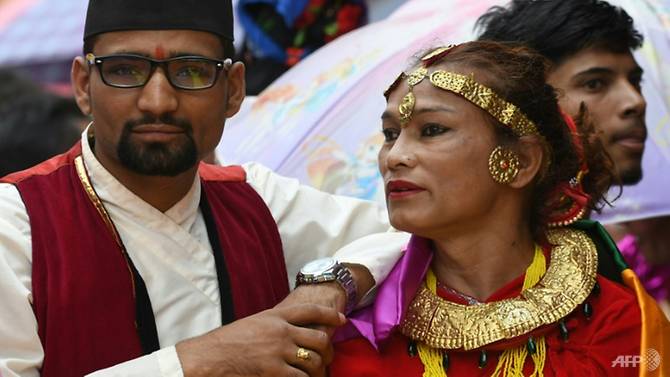
Nepal is one of the few Asian countries that allow its transgender citizens to request to have their gender marker on state-issued identity documents changed.
According to the Human Rights Watch, the Supreme Court ruled in 2007 that the government must recognize the third gender category for individuals who identify with gender identity other than the one assigned at birth.
Since then, advocates successfully pushed for legal gender recognition reflected in several official documents including voter’s list, national census, citizenship files, and passports.
The progressive climate in Nepal allowed Monika Shahi Nath to become the country’s first transgender individual to be granted with passport marked O for other gender in 2015, according to report by Channels News Asia on Monday.
Nath, 40, born and raised in a remote village in western Nepal, has again made history after she secured a marriage certificate with her 22-year-old husband, Ramesh Nath Yogi, in May from district officials despite the fact that there are no laws that cover such unions.
She initially worried that she would not be accepted by her in-laws for her being a trans woman. However, she was welcomed into the family.
“We are happy and feel accepted as husband and wife,” she said.
Never expecting that she would be married, she stated, “I never dreamed that one day I would be someone’s wife, that I would be loved as a daughter-in-law.”
Coming back home with her husband with a wedding ring and wearing a short red dress was one for her first visits as a woman, adding that her marriage had made it easier living as a married woman .
“They truly see me as a woman now,” she said.
Her husband’s family, who lived in a village six-hour drive away, was at first resistant to the union, but the community has grown to accept them.
“Her relationship with the family and with the people in the community is very good. We think it is okay,” Laxmi Nath Bista, a neighbor, explained. “The idea of third gender is very new to people around here, many people don’t understand what it means. But her behaviour is good with everyone, so they are accepting of her.”
Nath shared that growing up in her village, she was known as a boy named Manoj and always felt different. She wanted to sit with the girls and was fascinated with the way women dress themselves.
She started cross-dressing in her early twenties, stealing her sister’s clothing and escaping to the closest city for days. She said, “Away from my home, I would secretly become a woman. It would make me very happy, but I was afraid to tell my family, I felt I would shame them.”
Her work as an activist and her gender identity were considered taboo in her family. It was something that was not talked about openly.
Even though Nepal has made remarkable strides in recognizing transgender rights in the past few years, some critics believed that more needs to be done as members of the LGBT community continue to be marginalized in society.
For instance, legislation that would allow same-sex marriage was introduced two years ago but has not progressed since. Many transgender individuals remain reclusive, struggling to open up about their gender identity.
For Nath, being a wife is a blessing although it is still unclear what her marriage’s legal standing is and believes that the state must do something to further improve the situation for all LGBT members.
“I am blessed to be someone’s wife, but the government needs to make the legal changes so people can easily marry the person they love,” she said.



Be the first to comment